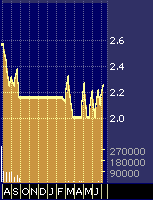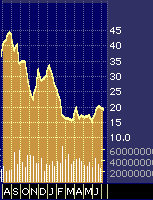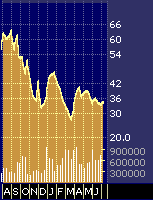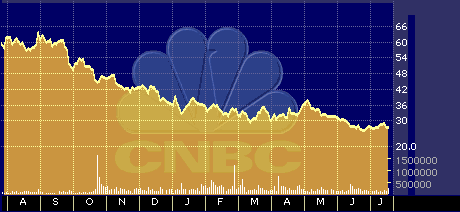
Can Other ASPs Match Cobalt’s Success?
Can Other ASPs Match Cobalt’s Success?
by Hal Plotkin
Silicon Valley Correspondent
Although application service provider (ASP) enabler Cobalt Networks Inc. {COBT} continues to sell products at a torrid pace, several analysts who follow ASP trends say larger firms targeting the same market are facing considerable resistance from many of their biggest potential customers.
That means betting on the largest would-be ASP firms, such as Baan Co. N.V. {BAANF}, Oracle Corp. {ORCL} and SAP Aktiengesellschaft {SAP}, might not be the best way to play the much-talked-about ASP sector moving forward. The larger firms, which have their roots in database management and enterprise resource planning (ERP) markets, may still have a lot going for them. But leading ASP analysts say they will probably be left out of the ASP party for at least the next few quarters. Although it is less likely, it is even possible such firms might miss the fast-moving ASP boat entirely.
ASP’s are often said to be one of the hottest business-computing sectors moving forward. The idea behind an ASP is that business customers will choose to rent whatever software applications they need over the Internet on a per-use basis, rather than purchase them.
The advantage for customers is the ability to rapidly deploy state-of-the art constantly updated information-technology systems without the expense or delay of a custom installation. ASP vendors, on the other hand, get a potentially more-lucrative recurring-revenue model tied to rental sales, rather than one-shot software per-seat licenses.
Projections for the overall ASP market are all over the map, depending on which particular applications are counted. Forrester Research, based in Cambridge, Mass., for example, forecasts spending on outsourced applications will grow over 100 percent a year to reach $21 billion by 2001.
The projections are a little cloudy, however, since Web hosting, which is sometimes considered an outsourced application, accounts for a large part of the projected sales. International Data Corp., for example, puts the Web-hosting market at $6.1 billion in 2001. The bulk of ASP sales moving forward, however, are expected to come from more-basic business applications, such as back-office accounting, personnel management, benefits administration, sales force automation, design and manufacturing information systems.



(top to bottom) 52-week stock performances of Baan, Oracle & SAP
The problem, however, is the dogs apparently don’t want to eat the dog food. At least not the really big dogs.
Fully 78 percent of several hundred large companies recently surveyed by Forrester Research, based in Cambridge, Mass., for example, report they aren’t currently using any ASPs. More alarmingly, 65 percent of those firms said they would not even consider using ASPs in the future. Large firms are key targets for firms such as Baan, Oracle and SAP, none of which have traditionally been focused on smaller, mid-market customers.
“What we’re seeing is that many large companies have just made a big investment in their ERPs and customer relationship-management software systems,” says Stacie McCullough, senior analyst at Forrester Research. “They’re not willing to get out of that now.”
McCullough says that many large company respondents to the Forrester survey expressed fears the ASP software delivery model might not adequately protect the confidentiality of their sensitive data, nor provide them with the speed or flexibility they require. “I don’t agree with all that,” she adds. “But it’s what the biggest potential customers are telling us.”
“A whole lot of things are going to have to kick in before the ASP market develops,” agrees Harry Tse, vice president at the Yankee Group, based in Boston. “But people on Wall Street have already bought into the hype.”
Tse says actual non Web-hosting ASP sales are lagging the projections. “Last year, we can only count $290 million worldwide,” he says. “We projected $1 billion in ASP sales for 2000, significantly smaller than many other numbers out there. But it may not even hit that.”
Tse cites the same factors as the Forrester analyst for the ASP sales bottleneck. “A manufacturer would be extremely unlikely to outsource their manufacturing [information technology] system,” he says. “The real opportunity right now for ASPs is in vertical markets and selling. That kind of demand has to kick in before the ASP market explodes.”
Mountain View, Calif.-based Cobalt Networks, which is more focused on those areas, has been one of the bright spots in the ASP-enabling market.
Cobalt Networks went public on Nov. 4, with shares initially priced at $22. The stock quickly shot up to more than 160 before falling back to the 80 range more recently.
In January, Cobalt Networks announced record quarterly revenue of $9 million, an increase of 343 percent over the same period a year earlier. Losses totaled $8.6 million over the fourth quarter.
“We see ourselves as the next really big franchise,” says Stephen DeWitt, Cobalt Network’s president and CEO. Losses aside, DeWitt says investors should focus on the fact that Cobalt is carving out a leading role for itself as a key enabler of ASPs with a clear focus on the parts of the market that are already growing at a rapid clip. Fifty percent of the firm’s sales, he notes, now come from markets outside the United States
“It validates what we’re doing,” DeWitt says. “There’s a clear value proposition for our customers.” The firm recently inked a deal with Nippon Telephone & Telegraph Co. {NTT}, Japan’s largest telecommunications provider, which is using Cobalt boxes to deliver wireless e-mail applications.

Nippon Telephone & Telegraph 52-week stock performance
Cobalt sells inexpensive hardware with embedded software that is used by Internet service providers, telephone companies and end users to support the delivery of ASP services. An ASP vendor can buy a Cobalt box for as little as $1,200, which they can use to provide dedicated pay-as-you-go ASP services to their own customers.
“Since you’re talking about maybe a $100 a month charge to end customers from the ISP, it’s a model that allows rapid profitability,” DeWitt says. “More importantly, they can scale their businesses in direct relationship to demand. It’s a variable cost model. The service providers themselves designed our product. It’s what they asked for.”
DeWitt says he agrees with industry analysts on overall ASP trends. “Selling and e-commerce is the killer ap right now,” he says. “The market will grow over time, but we are selling into the sweet spot.”
DeWitt says Cobalt is tapping into the strong demand for first-generation ASP services, which are primarily related to smaller and mid-size firms opening up storefronts on the Web. ISPs using Cobalt’s blue cube boxes, for example, can get an online shop up and running, and taking orders, within a few hours.
“What’s important for our customers is application-integration reliability,” DeWitt says. “You cannot have a value proposition built on hardware. It’s the strength of the applications that matter. With Cobalt, you’ll reach physical meantime failure [on the hardware] before you ever reach application meantime failure. That’s what matters to customers. They want something simple they can plug today that works. That’s what we give them.”
“Wall Street is applauding this model for some very good reasons,” says Greg Blatnik, managing director at Zona Research, based in Redwood City, Calif. “Where you’ll really see this understood and absorbed is with the start-ups and dot-coms. They need to be more agile, and they don’t have to build anything. The ASP model gives them the chance to go from business plan to implementation without any delay.”
“I don’t think Cobalt’s success tells you too much about ASPs in general since there is no way to tell what their boxes are used for,” Blatnik says. “But e-mail and selling are highly used and significant outsourced applications. The big companies are more reluctant to outsource their mission critical stuff. So the smaller, mid-market is the right place to be.”
Cobalt Networks is expected to announce its earnings report for the March quarter some time between April 15 and 18. DeWitt says the firm remains on track for another strong quarter.
In part two of this two-part story Friday, we look at three potentially hot mid-tier ASP stocks.


